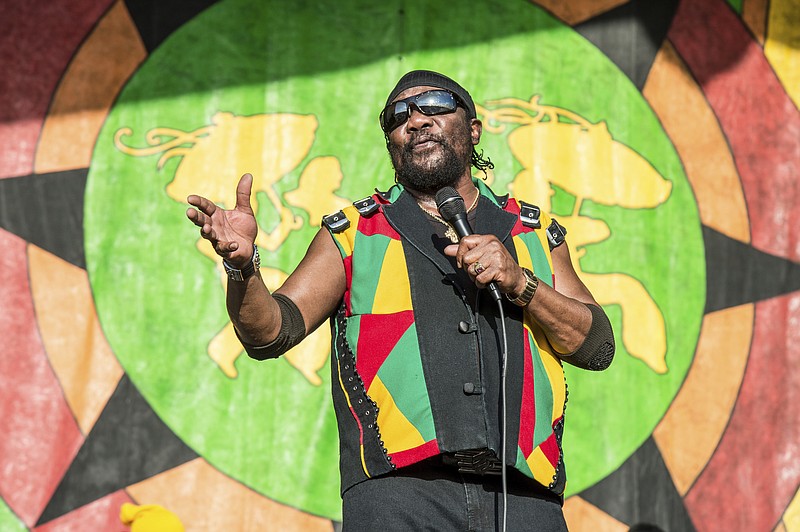NEW YORK -- Toots Hibbert, one of reggae's founders and most beloved stars who gave the music its name and later helped make it an international movement through such classics as "Pressure Drop," "Monkey Man" and "Funky Kingston," has died. He was 77.
Hibbert, frontman of Toots & the Maytals, had been in a medically-induced coma at a hospital in Kingston since earlier this month. He was admitted in intensive care after complaints of having breathing difficulties according to his publicist. It was revealed in local media that the singer was awaiting results from a COVID-19 test after showing symptoms.
News of the five-time Grammy nominee's ill-health came just weeks after his last performance, on a national live-stream during Jamaica's Emancipation and Independence celebrations in August.
A family statement said Hibbert died Friday at University Hospital of the West Indies in Kingston, Jamaica, surrounded by family.
A muscular ex-boxer, Hibbert was a bandleader, songwriter, multi-instrumentalist and showman whose concerts sometimes ended with dozens of audience members dancing with him on stage. He was also, in the opinion of many, reggae's greatest singer, so deeply spiritual he could transform "Do re mi fa so la ti do" into a hymn. His raspy tenor, uncommonly warm and rough, was likened to the voice of Otis Redding and made him more accessible to American listeners than many reggae artists. Original songs such as "Funky Kingston" and "54-46 That's My Number" had the emotion and call and response arrangements known to soul and gospel fans. Hibbert even recorded an album of American hits, "Toots In Memphis," which came out in 1988.
Never as immersed in politics as his friend and great contemporary Bob Marley, Hibbert did invoke heavenly justice in "Pressure Drop," preach peace in "Revolution," righteousness in "Bam Bam" and scorn his 1960s drug arrest and imprisonment in "54-46 That's My Number." He also captured, like few others, everyday life in Jamaica in the years following its independence from Britain in 1962, whether telling of wedding jitters ("Sweet and Dandy") or of trying to pay the rent ("Time Tough"). One of his most popular and surprising songs was his reworking of John Denver's nostalgic "(Take Me Home) Country Roads," with the setting changed from West Virginia to a world Hibbert knew so well.
•••
Almost heaven, West Jamaica
True ridge mountains
Shining down the river
All my friends there
Older than those ridge
Younger than the mountains
Blowin' like a breeze
•••
As with other reggae stars, Hibbert's following soared after the release of the landmark 1972 film, "The Harder They Come," which starred Jimmy Cliff as a poor Jamaican who moves to Kingston and dreams of a career in music. The Jamaican production was a word of mouth hit in the U.S. and the soundtrack, often ranked among the greatest in movie history, included the Maytals' "Pressure Drop" and "Sweet and Dandy." Hibbert also appeared in the film, as himself, recording "Sweet and Dandy" in the studio while Cliff's character looks on with awe. Around the same time, the Maytals signed with Island Records and released the acclaimed album "Funky Kingston," which the critic Lester Bangs called "the most exciting and diversified set of reggae tunes by a single artist yet released."
By the mid-1970s, Keith Richards, John Lennon, Eric Clapton and countless other rock stars had become reggae fans and Hibbert would eventually record with some of them. .
Married to his wife, Doreen, for nearly 40 years, Hibbert had eight children, including the reggae performers Junior Hibbert and Leba Hibbert.
Frederick Nathaniel Hibbert ("Toots" was a childhood nickname) was born in May Pen, Parish of Clarendon. He was the son of Seventh-day Adventist ministers and would remember miles-long walks along dirt roads to schools, hours of singing in church and private moments listening to such American stars on the radio as Ray Charles and Elvis Presley.
The Maytals began when ska was the most popular music, continued to rise during the transition to the slowed down rocksteady and were at the very forefront of the faster, more danceable sound of the late '60s. Their uptempo chant "Do the Reggay" is widely recognized as the song which gave reggae its name.
